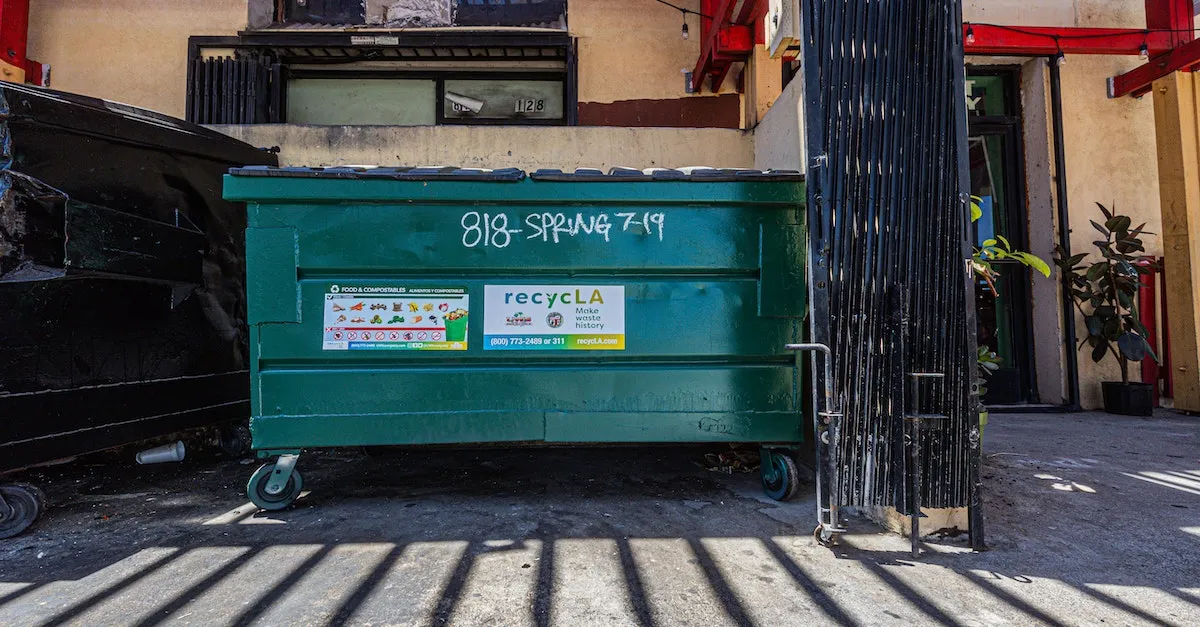Is Dumpster Diving Legal In California?
Dumpster diving brings up images of people sorting through trash to find hidden treasures. But is this actually legal in California? The short answer is – it’s complicated.
In this comprehensive guide, we’ll analyze relevant California laws and case studies to determine the legality of dumpster diving. We’ll look at trespassing, privacy, and abandonment laws that create gray areas around this activity.
Defining Dumpster Diving in California
Dumpster diving is the practice of searching through trash containers, particularly dumpsters, in search of discarded items that may still be useful or valuable. In California, dumpster diving is a somewhat contentious topic, with varying opinions on its legality and ethical implications.
To fully understand the practice of dumpster diving in California, it is important to delve into its history, common motivations, and dispel some misconceptions.
Brief history of dumpster diving in the state
Dumpster diving has been around for decades and has gained popularity in recent years, especially in urban areas. In California, the practice has its roots in the counterculture movements of the 1960s and 1970s, where individuals sought alternative ways of living and reducing waste.
Today, dumpster diving is not limited to any specific group of people and can be seen as a way to reduce consumerism and promote sustainability.
Common motivations for dumpster diving in CA
There are several motivations that drive individuals to engage in dumpster diving in California. One primary reason is to reduce waste and promote environmental sustainability. By rescuing items from the trash that are still usable, divers can divert them from landfills, ultimately reducing the environmental impact of consumer waste.
Another motivation is economic necessity. In a state with a high cost of living, dumpster diving can provide a means of obtaining necessities like food, clothing, and household items for those who may be struggling financially.
It can be a resourceful way to meet basic needs and alleviate financial strain.
Additionally, some individuals are drawn to dumpster diving as a form of activism. By publicly highlighting the amount of waste generated by businesses and individuals, divers hope to raise awareness about the need for sustainable practices and encourage others to reduce their consumption and waste.
Misconceptions about divers and their practices
There are several misconceptions surrounding dumpster divers and their practices. One common misconception is that all divers are homeless individuals. While some divers may be experiencing homelessness, many others are simply looking for ways to reduce waste, save money, or engage in activism.
Another misconception is that dumpster diving is illegal in California. The legality of dumpster diving varies depending on local ordinances and regulations. While some cities and counties may have restrictions in place, others may not explicitly prohibit the practice.
It is important for divers to familiarize themselves with local laws and regulations before engaging in dumpster diving.
California Trespassing Laws
When it comes to dumpster diving in California, it is essential to understand the state’s trespassing laws. These laws dictate what is considered legal and illegal when accessing private property without permission.
Violating these laws can lead to serious consequences, so it’s crucial to be aware of the relevant sections of the California Penal Code.
Relevant sections of CA penal code regarding trespassing
The California Penal Code addresses trespassing under various sections. One of the most frequently referenced sections is Section 602, which outlines the different forms of trespassing, including entering someone else’s property without permission.
Another relevant section is Section 602.8, which specifically addresses trespassing on property that has been posted with “No Trespassing” signs.
It’s worth noting that different sections of the Penal Code can apply depending on the circumstances of the trespassing incident. For example, if someone enters someone’s property with the intent to steal, they may also be charged with burglary, which is a more serious offense.
How these apply to diving on private property
When it comes to dumpster diving on private property, the laws regarding trespassing still apply. If the property owner has explicitly prohibited access to their property, either by posting signs or verbally communicating their wishes, entering their property without permission could be considered trespassing.
However, it’s important to note that laws regarding dumpster diving can vary across different municipalities and counties within California. Some cities have specific ordinances that allow or prohibit dumpster diving, so it’s crucial to research and familiarize yourself with the local regulations.
Consequences for trespassing
The consequences for trespassing in California can vary depending on the circumstances and severity of the offense. Trespassing is generally considered a misdemeanor, punishable by fines and potential jail time.
The specific penalties can range from a few hundred dollars to up to six months in jail, depending on the situation.
It’s important to remember that this information is not legal advice, and consulting with an attorney is always recommended if you have specific concerns about trespassing laws in California.
If you want to learn more about California’s trespassing laws, you can visit the California Legislative Information website for more detailed information on the relevant sections of the Penal Code.
Expectation of Privacy
When it comes to dumpster diving, the expectation of privacy is a crucial factor to consider. The Fourth Amendment of the United States Constitution protects individuals from unreasonable searches and seizures.
This means that people have the right to be free from government intrusion into their personal affairs without a valid warrant. However, this protection may not extend to trash left outside for collection.
4th Amendment protections against unreasonable searches
The Fourth Amendment provides protection against unreasonable searches and seizures. It requires law enforcement to obtain a warrant based on probable cause before conducting a search. However, courts have generally held that once trash is left outside for collection, it is considered abandoned property and no longer protected by the Fourth Amendment.
California’s right to privacy laws
Although dumpster diving may not violate the Fourth Amendment, California has its own set of laws protecting an individual’s right to privacy. California Constitution Article 1, Section 1 states, “All people are by nature free and independent and have inalienable rights.
Among these are enjoying and defending life and liberty, acquiring, possessing, and protecting property, and pursuing and obtaining safety, happiness, and privacy.” Therefore, individuals in California may have additional protections beyond those provided by the Fourth Amendment.
When trash is considered abandoned property
Trash that is left outside for collection is generally considered abandoned property. Once discarded, individuals no longer have a reasonable expectation of privacy in their trash. This means that anyone can legally search through and take items from trash bins or dumpsters without violating any laws.
It is important to note that although dumpster diving may be legal in California, it is essential to respect private property rights and exercise caution while engaging in this activity. Additionally, local ordinances or specific circumstances may impact the legality of dumpster diving in certain areas.
It is advisable to research and understand the laws and regulations in your specific location before engaging in dumpster diving.
Other Legal Considerations
Local ordinances prohibiting rummaging
While dumpster diving may be legal on a state level in California, it’s important to note that some local municipalities may have their own ordinances that prohibit or regulate rummaging through dumpsters.
These ordinances can vary from city to city, so it’s crucial to familiarize yourself with the specific regulations in your area.
Liability for injuries while diving
It’s essential to be aware of the potential risks associated with dumpster diving. While it may seem like a harmless activity, there is a possibility of sustaining injuries while diving. In such cases, liability can be a complex issue.
Property owners may argue that they are not responsible for any injuries sustained by individuals who enter their dumpsters without permission. On the other hand, divers may argue that property owners have a duty to ensure the safety of their dumpsters.
Ultimately, the outcome of any legal disputes will depend on the specific circumstances of each case.
Ethical issues around dumpster diving
Aside from the legal considerations, dumpster diving also raises ethical questions. Some argue that it is a form of recycling and reducing waste, as it prevents usable items from ending up in landfills.
Others, however, argue that it may infringe on the rights of the property owner and contribute to a negative image of certain neighborhoods or businesses.
It’s important to consider both sides of the ethical debate and make your own informed decision. If you decide to engage in dumpster diving, remember to do so responsibly and with respect for the property and privacy of others.
Diving Legally and Ethically in California
Many people are drawn to the practice of dumpster diving due to its potential for finding valuable items or reducing waste. However, it is important to understand the legal and ethical considerations before engaging in this activity.
In California, dumpster diving is generally legal, but there are certain guidelines and best practices to follow to ensure you stay within the bounds of the law and maintain a respectful approach.
Tips to Avoid Legal Trouble
To avoid any legal issues while dumpster diving in California, it is crucial to be aware of the following tips:
- Familiarize yourself with local laws and regulations: While dumpster diving is generally legal in California, it is important to check with local municipalities for any specific restrictions or regulations.
- Do not trespass: Only dive in dumpsters located in public areas or with the permission of the property owner. Trespassing on private property can lead to legal consequences.
- Respect “No Trespassing” signs: If a dumpster is located on private property and is marked with “No Trespassing” signs, it is best to avoid diving in those dumpsters to avoid any legal trouble.
Best Practices for Safe and Considerate Diving
While legality is important, it is equally crucial to practice safe and considerate diving to ensure the well-being of yourself and others:
- Wear protective gear: It is advisable to wear gloves, closed-toe shoes, and long sleeves to protect yourself from sharp objects or potential hazards.
- Leave the area clean: After diving, make sure to leave the area as clean as or cleaner than you found it. This shows respect for the property and helps maintain a positive image of dumpster diving.
- Be mindful of noise and time: Avoid loud noises or diving during late hours to respect the peace and privacy of the surrounding community.
Alternatives like Supermarket Salvage
If dumpster diving doesn’t align with your preferences or if you are concerned about legal issues, there are alternative options available. One such option is supermarket salvage. Some supermarkets have programs in place that allow individuals to collect food items close to their expiration date, which would otherwise go to waste.
These programs aim to reduce food waste and provide an opportunity for those in need to access fresh produce and other food items.
For more information on supermarket salvage programs in California, you can visit the Feeding America website. They provide a directory of local food banks and organizations that may offer supermarket salvage programs in your area.
Conclusion
While the law around dumpster diving in California remains unclear, some best practices can help divers stay on the safe side. Avoiding trespassing, protecting privacy, and diving ethically are key considerations for this controversial activity.








